- Home
- P. T. Deutermann
The Last Man Page 31
The Last Man Read online
Page 31
He poured himself a small splash of cognac, thinking that soon he would be a true alcoholic. Skuratov was supposedly a high-ranking Shin Bet officer, whose responsibility was the security of the Israeli atomic weapons program laboratories. For some unknown reason, he’s sensitive about Masada, which is, admittedly, only forty kilometers or so from the Dimona atomic energy center. He is also thought to be involved with what Gulder called the new Kanna’im. And where had all the old Zealots ended their days? Masada. Great God: Was there a connection? It all kept coming back to Masada.
He heaved a sigh of resignation as he put down the cognac, untouched. He got up and went to find his old army coat and his car keys. Something was telling him to go see for himself. Now. Tonight. Go down to Masada.
It’s crazy. It’s Shabbat. Still something kept telling him:
Go. Now—and take a gun.
27
David wasted no time once he realized that the slab was down. He signaled for Judith to follow him back to the cave. At the entrance, he pantomimed that she was to wait right there while he made an emergency dive to the bottom of the cistern. She protested, but he insisted. He gestured for her to remain at the cave entrance so he could find it again quickly, homing in on her headlamp. She finally understood and parked herself in the entrance. He swam back away from her, oriented himself with the compass again, and headed down to the bottom of the cistern.
He did the dive calculations as he went down, his ears cracking. A hundred-plus feet. He didn’t intend to stay down there, but if someone had come into the bat cave and thrown everything there into the cistern, there might be some of those steel staging poles. He swam straight down, or as straight as he could with no visual cues, feeling the pressure squeeze his body. Going deep in a third dive in one day violated the nitrogen safety rules, but he had to know. Besides, he would be “surfacing” into air pressurized at thirty-five feet of water, which would act like a decompression stop. Sort of, anyway. He hoped it wouldn’t be a permanent one.
As he neared the bottom his headlamp illuminated a light cloud of silt. The bottom had been stirred up, probably by the avalanche of stuff thrown down from the bat cave. He slowed, hovering vertical now, his arms extended, until he felt his fingers pressing into soft mud. Moving slowly so as not to stir up any more silt, he felt around for anything on the bottom. Nothing. Then he had an idea. He switched off his headlamp. Sure enough, the reference light was glowing about fifty feet away. He swam over there, grabbed it, fastened it onto his arm, and encountered some cans of food, but no pipes. He expanded his search area and finally felt rather than saw a single staging pipe. Then a second one. He tried to lift them both but realized he would need help getting two of them to the cave entrance. He put the pipe back down near the second one and strapped the reference light onto one of the poles, pointing up. Then he swam back up toward the western wall of the cistern, shutting off his headlamp again as he passed through fifty feet, watching for Judith’s light. It appeared to his right, barely visible. He had gone way off course coming back up. He stopped and looked down. The reference light was just visible in the murky water, but it was visible.
He got to Judith and signaled that she needed to come down with him. He showed her the depth and pointed to her ears. She gave him the thumbs-up okay sign. He reached over and took off her headlamp and jammed it into a crevice near the entrance to the cave. Then he turned to swim back down, making sure she was following. Two minutes later they were on top of the pipes and the reference light. He explained with gestures that he wanted to take the two pipes back to the cave. She nodded. He tied the reference light’s rubber cord to one of the pipes in case they dropped one or both going up, then got the end of one pole in each hand. Judith lifted the other ends. Then they began to ascend, facing each other with the twelve-foot-long pipes between them like a stretcher.
At one point, near sixty feet, she stopped and shook her head, as if she were having problems clearing her ears. He stopped and watched her face grimacing in the mask. Then she nodded, and they started up again. Ten feet higher she stopped again and then suddenly grabbed her right ear, releasing her grip on one pipe. He tried to hold on to the pipe, but it slipped right out of his glove and disappeared down into the gloom, the reference light going with it. Not a total disaster, he thought. I can find it again with that light.
Judith was shaking her head and pointing down. She wanted to go back down to adjust the pressure on her ear. He nodded, holding on tight to the remaining pipe, and they maneuvered back down to sixty feet again. He watched her carefully as she went through more facial contortions behind her mask to clear her ear passage. Finally she signaled okay and they started up again. By the time he realized she was going up a whole lot faster than he was, the pipe was extended out to the full length of his arm and he couldn’t hold it. He almost yelled, but it was too late. He lost his grip on the pipe, which put its entire weight on her arm, and she dropped it immediately. They stopped ascending and watched it disappear into the depth below.
He swore mentally at their bad luck and then closed with her. He tried to read panic in her eyes behind the faceplate of her mask, but there was only embarrassment. He indicated they had to go back. To get one pipe this time, he signaled. She understood. Not that they had any choice, he thought. Only one pipe had a light on it. The other one was lost forever in all that silt. Plus, they couldn’t safely keep going back down to that depth.
He held her hand for a moment and turned off his headlamp. He looked up and could see a faint glow off to their left. Her headlamp was still there. Good. He looked down. There was a glow, but it was so diffused now in the silt as to be almost useless. He pointed down, and they began their descent. He left his light off. At a hundred feet they encountered the bottom. The glow was more distinct now, but it was way off to the southeastern side of the cistern. They swam that way, undoubtedly churning up silt clouds behind them, but David was focused on finding that light. It looked to be fifty feet away. Forty feet. They slowed to keep the silt disturbance minimized.
Thirty feet.
Twenty feet.
The light was visible now as a small purple glimmer. It’s probably buried in the silt, he thought; we’re lucky we could see it at all. They slowed even more, and then they were ten feet away. He looked for the pipe but couldn’t see it. It must be truly buried in all the silt, which was now boiling away from them along the bottom.
Away? Was there a current down here? He couldn’t imagine how that could be, but there was. Then he saw that they were almost up against the southeast wall of the cistern. He checked depth: one hundred twelve feet. They couldn’t stay here. But there, right in front of them, at a height of about six feet off the bottom, was a four-inch-diameter pipe protruding a foot out of the rock wall. A modern steel pipe, with a concrete-collared flange. What the hell was this, he wondered. He switched his head light on to examine it, but then something grabbed his forearm with a grip so strong he almost lost his mask whipping his head around.
It was Judith. She was pointing to something to the right of the pipe, something black, with glints of metal and what looked like glass. Oh, shit, he thought. That’s a wet suit … and a mask … and the white object behind the mask was a skull. The wet suit was striped with wide yellow and dark red bands. There were white bone fragments where the feet and hands had been.
Then Judith made a screaming noise in her mask, releasing a huge cloud of bubbles, and shot up out of sight like a rocket.
His immediate instinct was to follow her, but he remembered the staging pipe. He couldn’t come down here again. Taking a last look at the skeleton in the wet suit, he doused the light again and homed in on the partially buried reference light. He felt around for the pipe and grabbed it, but it was stuck under something. The silt was obscuring everything, turning his lamplight brown in the water.
He felt along the pipe until he encountered what felt like a huge timber. He swept away the silt cloud, trying to clear the water, trying
to see what it was. Then he saw the glint of metal. Bright metal, like stainless steel. The silt returned, obscuring everything. He knew his time at this depth was going to kill him if he didn’t get upstairs in a hurry. He felt along the object. It was cylindrical, maybe two feet in diameter. He couldn’t tell how long it was. There was another one, and another one. At least three. Now he was stretched out, holding onto the staging pipe, and couldn’t move to his right anymore. He felt the stirrings of euphoria.
Gotta go, gotta go!
He went back to the pipe, wrestled with it, got it loose, and started up, hoping like hell Judith hadn’t gone all the way up to the ceiling at that speed. Hoping she’d remembered to blow air out of her lungs.
It was a struggle going up with the heavy pipe, but then he remembered his BCD. He adjusted the inflation slightly, and it was much easier going. He cursed himself for not thinking of that a whole lot earlier. His mind wasn’t working at top form just now. Nitrogen does that, a nasty little voice told him.
As he rose slowly past fifty feet he began to work his way to the west, dousing his headlamp so he could home in on the light that he hoped was still in that crevice by the cave entrance. He wondered where Judith was, and even more, what the hell that pipe was about, not to mention a dead scuba diver and stainless steel cylinders sitting on wooden beams down on the bottom. So much for their being the first humans in this cistern during the past two thousand years. This changed everything.
Holding the pipe across his chest now, he rose to the correct depth for the cave entrance while looking around for the light. When he finally spotted it, he adjusted his BCD to achieve neutral buoyancy and then kicked over toward the west wall. He was relieved to see Judith swim out of the darkness from below him. That was a good sign: she had not gone blasting all the way to the top of the cistern. When she saw David, she swam over to the entrance and retrieved her own headlamp. Together, they wrestled the staging pipe into the narrow cave and through the air-water interface, where they pulled it and themselves up onto the shallow sand. Then they flopped down on the sand themselves, resting on their air tanks and breathing noisily.
His headlamp illuminated her pale and frightened face. There was something major going on here that he didn’t understand. He looked around the cave and made a decision. He popped his mouthpiece out, lifted off his mask, and carefully sampled the cave air. It was musty and smelled faintly sulfurous, but there definitely was oxygen. When he felt that it was probably safe to breathe it, he gestured for her to do the same. She followed suit and then flopped back on her side, tucked her knees up to her chest, and began to sob, her headlamp shining down into the fine sand.
He slipped out of his scuba rig and shut off his air tank before going to her and securing her air. He kept his headlamp on but reached over and turned hers off to conserve the battery. She was shaking silently. He wanted to pick her up and hold her, but it would be awkward—she was still in her diving rig. She was following his instructions but keeping her eyes closed tight. He helped her out of her tank rig and then sat down beside her.
“What?” he asked softly, putting his arm around her shoulders. “Look, you panicked down there. That happens. Don’t—”
“No,” she sobbed. “No. I did not panic. Not in the way you mean.”
The hell you didn’t, he thought, but didn’t say it. “What, then?” he asked, unsure of what was going on.
She rubbed her eyes and then massaged the sides of her face where the mask had been. Her normally composed expression was shattered. She was more than a little white-eyed, and her skin was uncharacteristically pale against the oval frame of her hood.
“That suit down there?” she said. “I recognized that suit. Oh, David, my God! I think that, that … thing down there was my husband. That was Dov!”
* * *
Yosef Ellerstein was stopped by an army police truck on the Dead Sea highway just below Qumran. Israeli citizens were not forbidden to be in their cars at night in this area, but since there was technically nowhere for him to be going, the patrol leader naturally stopped the car and asked where Ellerstein was bound. He identified himself and then explained that there was a problem at Masada.
“Metsadá?” the young lieutenant asked. “It’s closed. What kind of a problem?”
“Do you know who Colonel Skuratov is?” Ellerstein asked the young officer.
“No. He is army?”
“Not exactly. He is Shin Bet. I think. He has something to do with security at the Dimona laboratories.”
“Dimona?” the officer echoed. He looked around, his face registering total confusion. “What does Dimona have to do with you, Professor? Or Metsadá, please?”
Ellerstein threw up his hands. He could see the faces of the other patrol troops looking at his car through the canvas windshields on the back of the truck. “I’m not sure,” he admitted. “I have done some occasional, um, research work for Colonel Skuratov. Listen: I believe that there is an American tourist up on the mountain, doing some unauthorized exploration. I believe Colonel Skuratov might be up there, too.”
He saw the disbelief in the lieutenant’s eyes. “I know,” Ellerstein continued. “It’s complicated. Look, let’s go down there, you and me. I think we need to get up on the mountain.”
“The site is closed and the cable car is shut down, Professor. That place, it’s four hundred meters straight up. How do you propose to get up on that mountain?” The way he said this made it clear that he didn’t think Ellerstein was up to it.
“The same way the Romans did,” Ellerstein replied.
The lieutenant blinked. The ramp. “Okay,” he said, “but first, I think I need to contact my headquarters.”
“Yes, you do that, Lieutenant,” Ellerstein nodded. “Emphasize that name, Skuratov. They won’t know me from spit, but they should recognize that name. In the meantime, I think we need to get down there. Something bad is going on. I’m sure of it.”
The lieutenant gave him a faintly patronizing look, shook his head doubtfully, and asked him to pull off the road and wait. Then he went back to the truck, climbed into the cab, and got on his radio. Ellerstein maneuvered his car to the side, shut the engine down, and waited.
He was sure of it, he’d said. Something bad was going on down there. He still could not make the connection between Dimona and Masada. Or maybe it was a connection between Skuratov and Masada. What in the world could it be? He looked in his mirror but could not see what was going on inside the truck because of the headlamps. He drummed his fingers on the steering wheel. Then there was movement behind him, a banging of truck doors. The lieutenant came back to his car.
“Battalion says to go down there and to take you with us, Professor. My orders are to sweep the site and to report.”
“Did they recognize the name Skuratov?”
“You know, that’s weird. At first, the duty officer gave me a ‘wait, out.’ Then he said to turn you around and have you return to Jerusalem. But then he said hold on, and this time he comes back and says to get down there. There will be a special security force coming over. An entire company.” The lieutenant looked at him to see if he understood the significance of that. Ellerstein, like just about every other adult Israeli male, had been in the army.
“A full company?” he exclaimed. “That’s a hundred men?”
“Yes. Probably special forces. He wouldn’t say anything more on the unsecure radio net. Just to move out, right now. So, Professor: We go, yes?”
“Absolutely—is that military road back up to the Roman camp still there?”
“Yes. You will please follow us, Professor. Oh, I told them that you thought this Colonel Skuratov may already be up there. Apparently that’s why the Dimona security reaction force is coming over. Does that make any sense to you?”
The army company was the Dimona reaction force? Oh-oh, he thought. “It just might, Lieutenant,” Ellerstein said. He should be calling Gulder, but he had no phone. “It just might. We should hurry now, ok
ay?”
* * *
“That was Dov?” David asked, staring at her. “Are you sure? I mean—”
“It’s the suit,” she said. She swallowed a couple of times to clear her throat. “There was a theory several years back about wet suits for the open ocean. If they bore the striped markings of venomous sea snakes, larger predators would stay away. Dov believed it and had a suit made with those colored stripes. It was unique. Other divers used to kid him about it. I would have to … to—”
“Yes, right, I understand, but I think that’s out of the question right now. You shouldn’t go back down to that depth again, and I damn sure can’t go back down that deep for a while. Besides, we need to figure out how we’re going to get out of this cave.”
Her face went crooked again. “Someone closed the entrance up above, yes?”
He looked around at the dimly lit walls of the cave. “Sure looks that way. You saw all our stuff in the cistern, and I had that slab wedged way back from the hole.”
“So someone must have known we were down here?”
“Yeah, and that’s what’s got me scared. I think someone wants us to stay down here.”
“Just like Dov,” she whispered, her eyes filling again. He pulled her over to him again, and she wept for a few minutes. He felt a wave of sympathy and had to resist the urge to kiss the top of her head. Then she took a deep breath and pulled away, wiping her eyes.
He rolled away, stood up, and began to scan the walls and the ceiling with his headlamp. Two skeletons in the mountain, he thought. One ancient, one not so ancient. A modern pipe pumping water into the cistern. A familiar-looking pipe, at that. Then he remembered the geothermal plant. The pipe coming out of that building had pointed back at the mountain. Same size. Same pipe? Was that why the young scientist had been diving into the big cistern? Or did it have something to do with those cylinders?

 The Nugget
The Nugget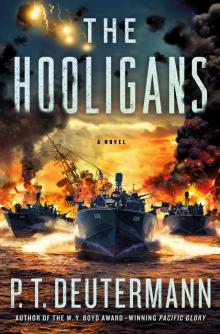 The Hooligans
The Hooligans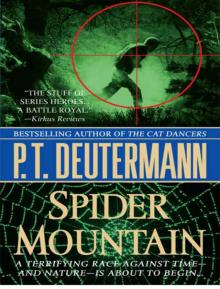 SPIDER MOUNTAIN
SPIDER MOUNTAIN![Cold Frame [retail] Read online](http://i1.bookreadfree.com/i/03/19/cold_frame_retail_preview.jpg) Cold Frame [retail]
Cold Frame [retail] Sweepers
Sweepers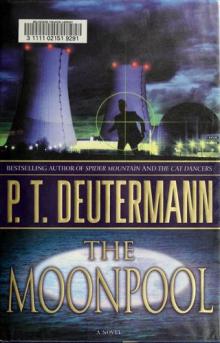 Cam - 03 - The Moonpool
Cam - 03 - The Moonpool Trial by Fire
Trial by Fire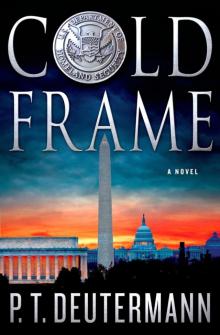 Cold Frame
Cold Frame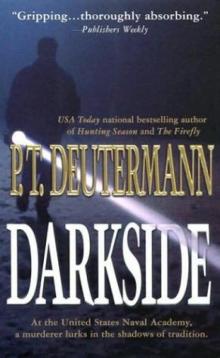 Darkside
Darkside Cam - 04 - Nightwalkers
Cam - 04 - Nightwalkers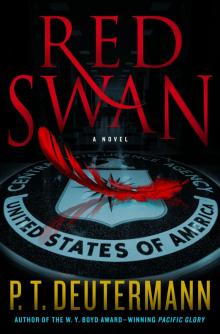 Red Swan
Red Swan The Commodore
The Commodore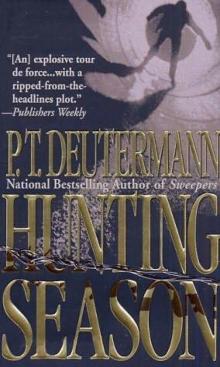 Hunting Season
Hunting Season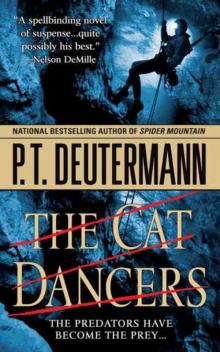 The Cat Dancers
The Cat Dancers Scorpion in the Sea
Scorpion in the Sea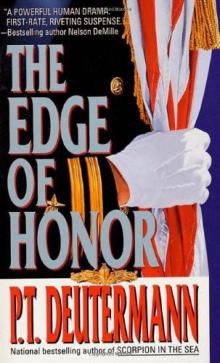 The Edge of Honor
The Edge of Honor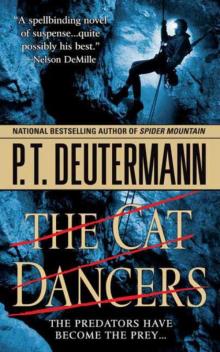 The Cat Dancers cr-1
The Cat Dancers cr-1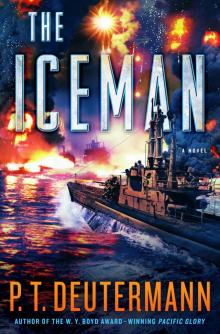 The Iceman
The Iceman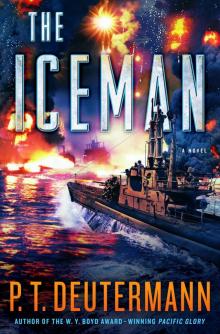 The Iceman_A Novel
The Iceman_A Novel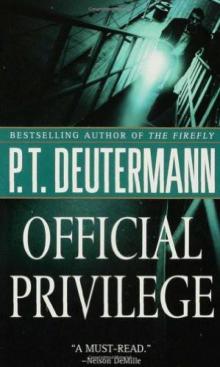 Official Privilege
Official Privilege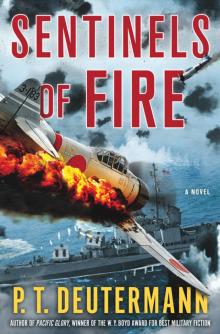 Sentinels of Fire
Sentinels of Fire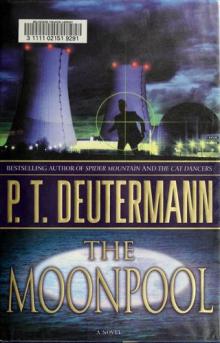 The Moonpool cr-3
The Moonpool cr-3 Nightwalkers cr-4
Nightwalkers cr-4 The Firefly
The Firefly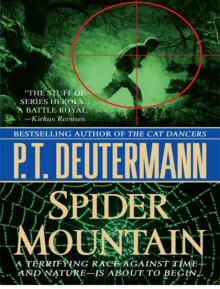 Spider mountain cr-2
Spider mountain cr-2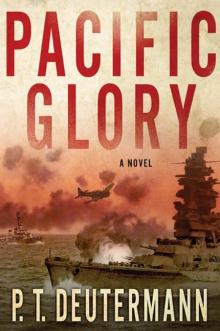 Pacific Glory
Pacific Glory The Last Man
The Last Man